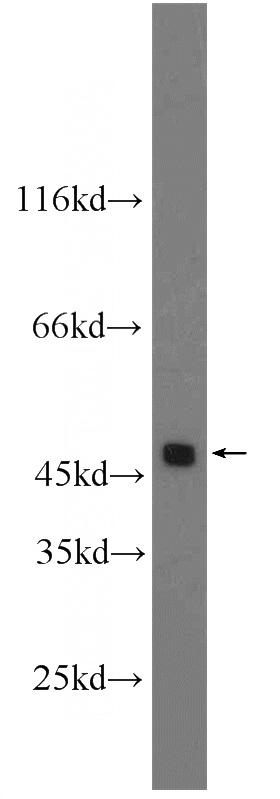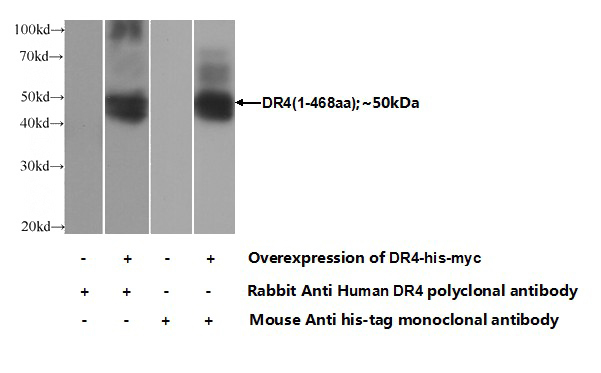-
Product Name
DR4 antibody
- Documents
-
Description
DR4 Rabbit Polyclonal antibody. Positive WB detected in Jurkat cells, HeLa cells, Transfected HEK-293 cells. Observed molecular weight by Western-blot: 44-50 kDa
-
Tested applications
ELISA, WB
-
Species reactivity
Human; other species not tested.
-
Alternative names
APO2 antibody; CD261 antibody; Death receptor 4 antibody; DR4 antibody; TNFRSF10A antibody; TRAIL R1 antibody; TRAIL receptor 1 antibody; TRAILR 1 antibody; TRAILR1 antibody
-
Isotype
Rabbit IgG
-
Preparation
This antibody was obtained by immunization of DR4 recombinant protein (Accession Number: NM_003844). Purification method: Antigen Affinity purified.
-
Clonality
Polyclonal
-
Formulation
PBS with 0.02% sodium azide and 50% glycerol pH 7.3.
-
Storage instructions
Store at -20℃. DO NOT ALIQUOT
-
Applications
Recommended Dilution:
WB: 1:500-1:5000
-
Validations

Jurkat cells were subjected to SDS PAGE followed by western blot with Catalog No:110012(DR4 antibody) at dilution of 1:1000

Transfected HEK-293 cells were subjected to SDS PAGE followed by western blot with Catalog No:110012(DR4 Antibody) at dilution of 1:20000
-
Background
Tumor necrosis factor (TNF)-related apoptosis-inducing ligand (TRAIL) is a member of the TNF superfamily. TRAIL activates apoptosis through the death receptors DR4 (also known as TRAILR1 and TNFRSF10A) and DR5 (also known as TRAILR2, KILLER and TNFRSF10B). DR4 and DR5 are single-pass type I membrane proteins that contain intracellular death domains (DD) and upon activation mediate apoptotic signals (PMID: 11163110). Binding of TRAIL to DR4 or DR5 results in receptor oligomerization and recruitment of FAS-associated protein with death domain (FADD) and caspase 8 to form a functional death-inducing signalling complex (DISC). Upon DISC formation, caspase 8 is cleaved and activated, which initiates the subsequent cascade of caspases (aspartate-specific cysteine proteases) mediating apoptosis (PMID: 18813321). DR4 or DR5 promotes the activation of NF-kappa-B and play an important role in inflammation (PMID: 9430227, 19434100).
-
References
- Li HY, Zhang J, Sun LL. Celastrol induces apoptosis and autophagy via the ROS/JNK signaling pathway in human osteosarcoma cells: an in vitro and in vivo study. Cell death & disease. 6:e1604. 2015.
Related Products / Services
Please note: All products are "FOR RESEARCH USE ONLY AND ARE NOT INTENDED FOR DIAGNOSTIC OR THERAPEUTIC USE"
